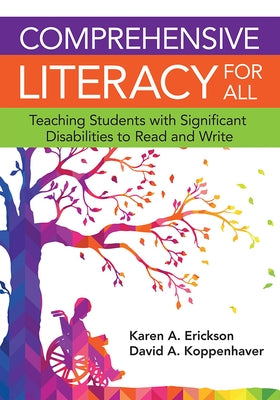Description
Literacy improves lives--and with the right instruction and supports, all students can learn to read and write. That's the core belief behind this teacher-friendly handbook, your practical guide to providing comprehensive, high-quality literacy instruction to students with significant disabilities. Drawing on decades of classroom experience, the authors present their own innovative model for teaching students with a wide range of significant disabilities to read and write print in grades preK-12 and beyond. Foundational teaching principles blend with concrete strategies, step-by-step guidance, and specific activities, making this book a complete blueprint for helping students acquire critical literacy skills they'll use inside and outside the classroom. An essential resource for educators, speech-language pathologist, and parents--and an ideal text for courses that cover literacy and significant disabilities--this book will help you ensure that all students have the reading and writing skills they need to unlock new opportunities and reach their potential. READERS WILL:
- Discover 10 success factors for helping students with significant disabilities become literate
- Teach emergent readers and writers skillfully, with evidence-based strategies for shared and independent reading, early writing instruction, and alphabetic and phonological awareness
- Help students acquire conventional literacy skills, with adaptable strategies for teaching reading comprehension, vocabulary, writing, decoding, and spelling
- Organize and deliver comprehensive literacy instruction in a variety of settings, both inside and outside of school
- Use assistive technology effectively to support reading, writing, and communication
- Engage and motivate students and make literacy instruction meaningful to their everyday lives PRACTICAL MATERIALS: Sample teaching scenarios and dialogues, how-to strategies, and downloadable resources, including sample lessons, a quick-guide to key literacy terms, lesson sequences, and flowcharts to guide instruction.
Author: Karen Erickson, David Koppenhaver
Publisher: Brookes Publishing Company
Published: 12/17/2019
Pages: 264
Binding Type: Paperback
Weight: 1.05lbs
Size: 10.00h x 6.90w x 0.70d
ISBN13: 9781598576573
ISBN10: 1598576577
BISAC Categories:
- Education | Special Education | Developmental & Intellectual Disabilitie
- Education | Special Education | Communicative Disorders
About the Author
Karen A. Erickson, Ph.D., David E. and Dolores J. Yoder Distinguished Professor, Director, Center for Literacy and Disability Studies, University of North Carolina at Chapel Hill
Karen A. Erickson is Yoder Distinguished Professor and Director of the Center for Literacy and Disability Studies at the University of North Carolina at Chapel Hill. A former teacher of children with significant disabilities, Dr. Erickson's current research addresses literacy and communication assessment and intervention for students with a range of disabilities, including significant disabilities. Dr. Erickson is codeveloper of the Tar Heel Reader online library of accessible books for beginning readers as well as several other assistive, learning, and communication technologies.David A. Koppenhaver, Ph.D., Professor, Department of Reading Education and Special Education, Appalachian State University
David A. Koppenhaver is Professor in the Reading Education and Special Education Department at Appalachian State University. His Dr. Koppenhaver's research focuses on literacy in individuals with signifi cant disabilities, including those with complex communication needs. He and David Yoder cofounded the Center for Literacy and Disability Studies at the University of North Carolina at Chapel Hill in 1990. David E. Yoder, Ph.D., is Professor and Chair of the Department of Medical Allied Health Professions at the University of North Carolina at Chapel Hill.
